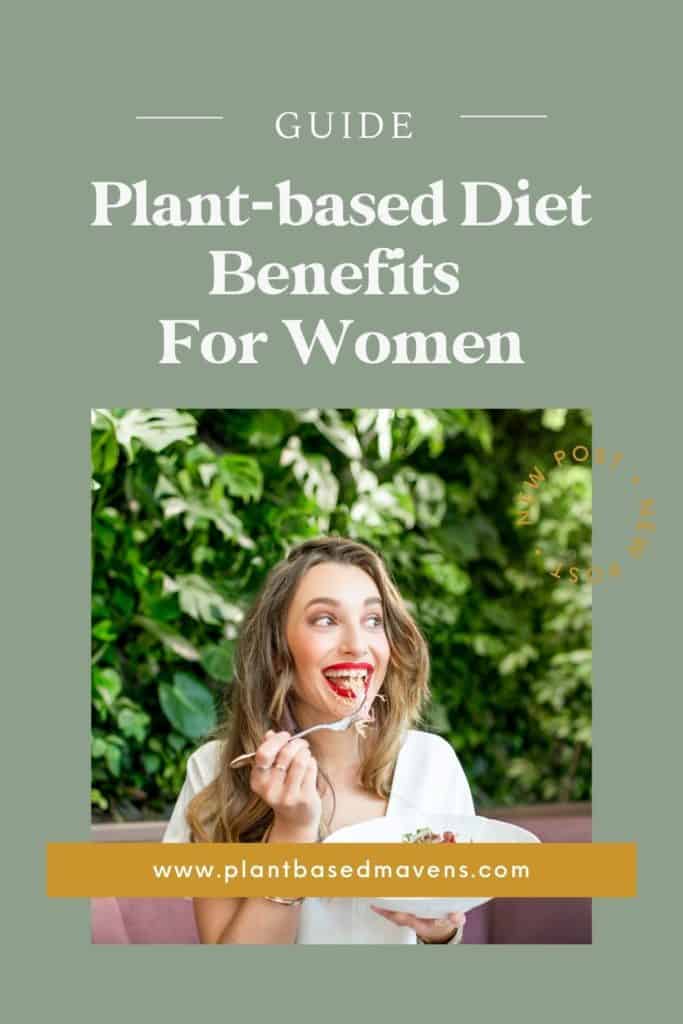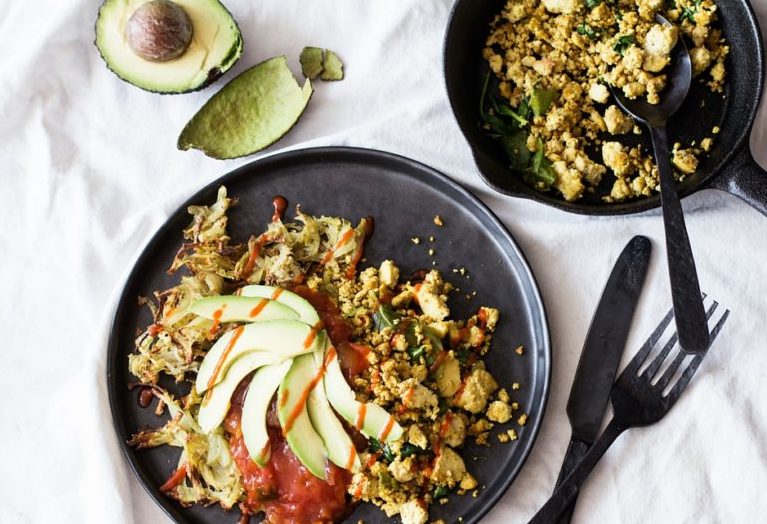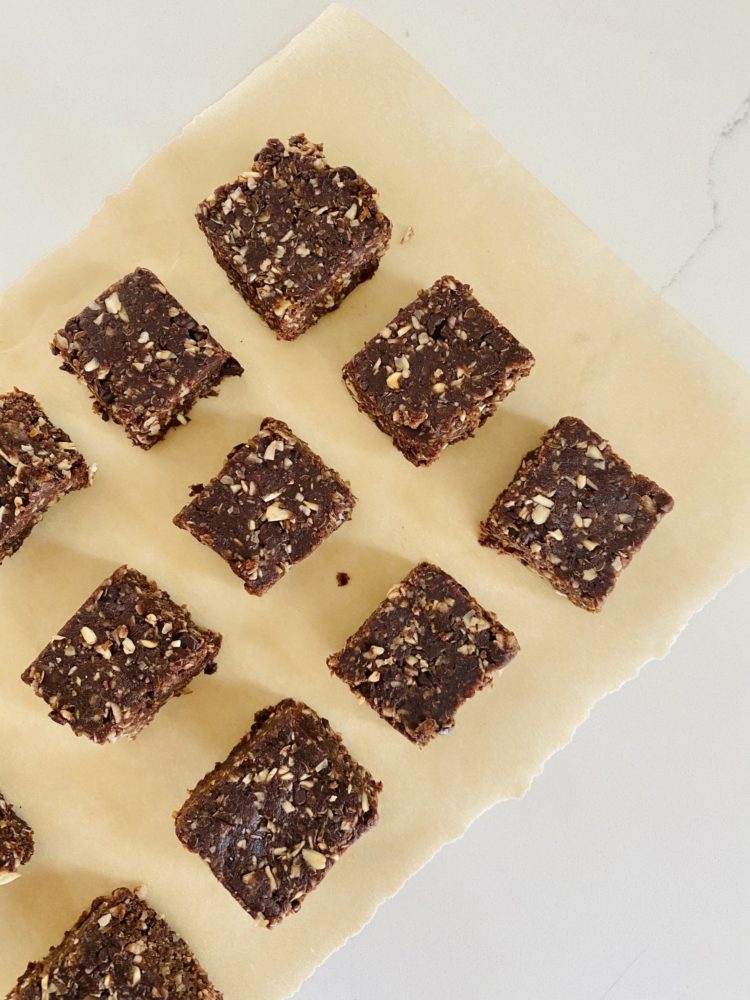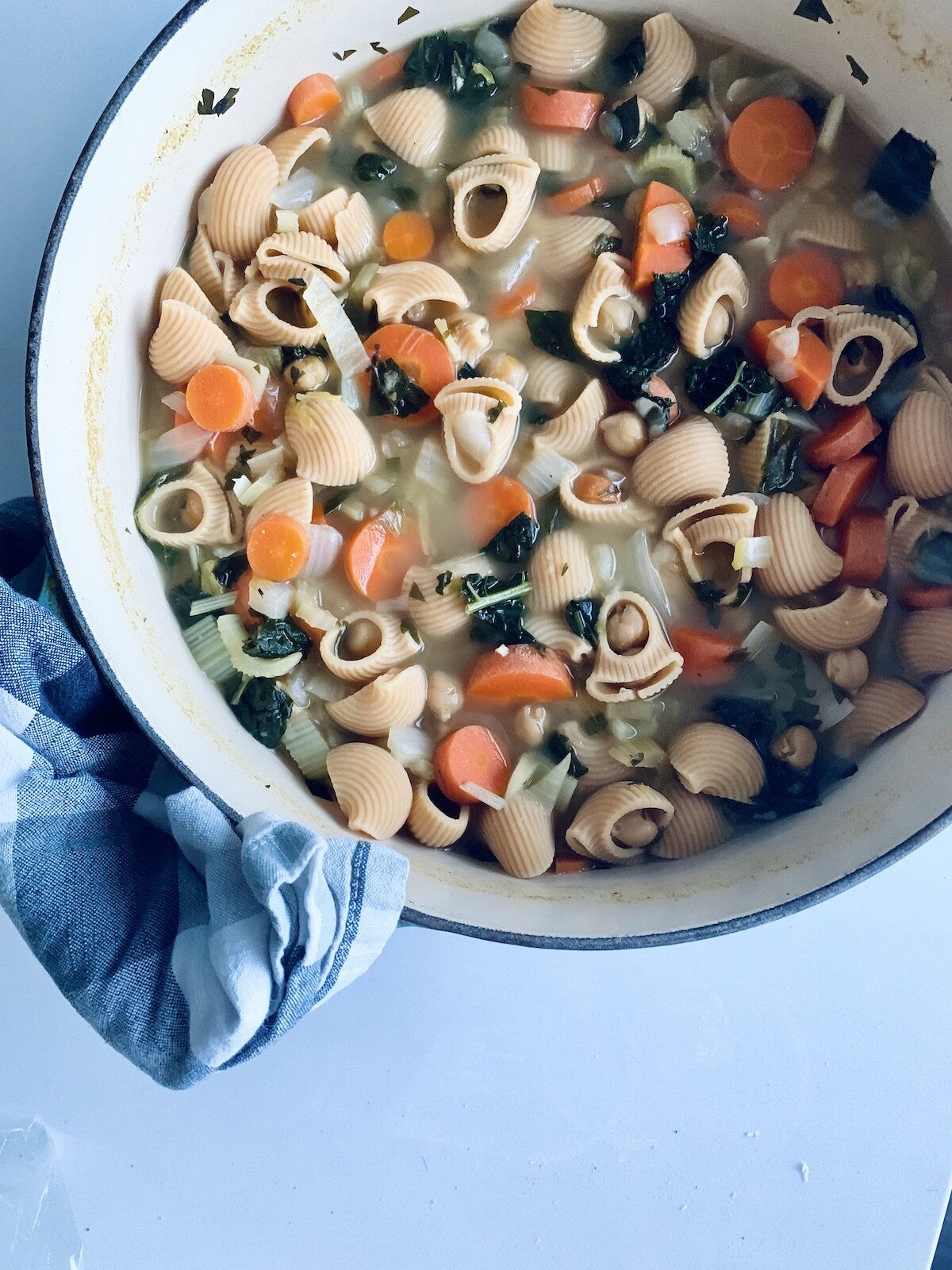Whether you’re considering trying a plant-based diet for the first time or you’re a plant-based veteran, a well-planned healthy plant-based diet for women offers many benefits unique to women’s health. Today, we’re digging in to those plant-based diet benefits, plus how to make sure your plant-based meals include all the important nutrients that women need.

Plant-based Diet Benefits For Women
Not only are plant-based foods safe for women at all life stages, it offers many benefits unique to women’s health and can help shape a balanced diet to reduce cancer risks and give you lots of potential health benefits. So, what are the benefits of a whole-food, plant-based diet for women? Here are just a few amazing benefits of plant-based eating:
Benefits of plant-based eating:
- A healthy microbiome and immune system
- Lower risk of many chronic diseases, including cardiovascular disease and certain types of cancers
- Lower risk of female-specific conditions like uterine fibroids and endometriosis
- Balanced hormones
- High luteal phase progesterone levels (and therefore enhanced fertility)
- Higher folate intake (an important nutrient for women)
- Normal ovulation
- Less menstrual-related pain
- Help to maintain a healthy weight
- And many more benefits!
Plant-based vs. Vegan
What exactly do we mean when we say “plant-based”? And how is it different than a vegan diet? There is no official definition of “plant-based”, but when we use that term at PBM we are referring to an eating pattern based predominantly on minimally processed plant foods like vegetables, fruits, whole grains, beans, nuts, and seeds and skipping animal products and dairy products whenever possible. It doesn’t mean you need to eat these foods 100% of the time, it just means you aim to eat them more often than not.
A vegan diet, on the other hand, is more defined. It excludes all animal foods or animal products including dairy products, eggs, meat, poultry, and fish, as well as all animal-derived ingredients like honey. A vegan diet is usually motivated by the ethical aspects of eating animal-based foods, while a plant-based diet could be motivated by ethical, health, environmental, or a combination of many reasons.
It’s okay to forego labels completely or to choose labels like plant-based, vegetarian diet, or vegan if they resonate with you. At PBM, we welcome everyone from the plant curious to the 100% vegan.
Plant-based Nutrition Guide For Women
Despite the many healthy plant-based diet benefits, you still need to put a little thought into what you eat to be sure you’re covering all of your nutrition needs. This is especially true for women since many nutrient needs increase or decrease as you transition through different life phases. For example, iron needs increase by 50% during pregnancy and then drastically decrease after menopause.
According to the Academy of Nutrition and Dietetics, appropriately planned vegetarian and vegan diets (which includes plant-based) are appropriate for all stages of the life cycle. The key here is that appropriately planned part. To be clear, a little planning is necessary for any healthy eating pattern, regardless of whether it’s vegan or plant-based. It’s helpful to have a basic knowledge of the food groups and nutrients that are important for you to thrive so you can make food choices that nourish you.
Let’s walk through a few of the key food groups included in a plant-based diet and how they benefit women’s health.
Vegetables and Fruits
There are so many benefits of the foods in this category, but one of the key benefits is phytonutrients.
Phytonutrients are naturally occurring compounds in plant foods, and many phytonutrients act as antioxidants and neutralize free radicals that if not kept in check, lead to cell damage, inflammation, and chronic diseases.
For example, sub-fertility is often accompanied by higher levels of oxidative stress. One of the best ways to lower oxidative stress is by eating plenty of antioxidant-rich foods. So when I’m doing a fertility consult, I’ll often start by helping my client increase phytonutrients in their meals.
A diet rich in the consumption of fruit and vegetables are associated with better fertility, regular and healthy periods, better mood and sleep, lower risk of endometriosis and fibroids, and extended reproductive lifespan – which is important since women experience 2% increased likelihood of cardiovascular disease death for each year of earlier onset menopause.
Plant foods, particularly vegetables and fruits, are the primary source of antioxidants. One study investigated the antioxidant content of more than 3,000 foods and found that on average, plant foods have 64x more antioxidants than meat, fish, eggs, and dairy.
In a recent study that followed tens-of-thousands of individuals, researchers found that higher intakes of fruit and vegetables were associated with lower mortality, 2 servings of fruits and 3 servings of vegetables per day was associated with the lowest mortality, and the risk reduction plateaued at about 5 servings of fruit and vegetables per day. The moral of this story? Aim to eat at least 5 servings of produce daily—a variety of fruits, green vegetables, leafy greens and colorful vegetables as well!
Non-starchy vegetables and fresh fruits also provide many vitamins and minerals that are vital to women’s health, which is why I always recommend that women especially emphasize leafy greens, cruciferous vegetables, citrus, and berries. These foods are good sources of vitamin A, folate, vitamin C, and calcium – all important nutrients for women’s health.
Whole Grains and Starchy Vegetables
When we talk about this group, we’re talking about complex carbohydrate sources – or carbohydrate sources that are closer to their “whole” form with their fiber and other nutritional benefits more intact.
Complex carbohydrates are correlated with improved fertility, steady blood glucose and improved insulin sensitivity, improvements in premenstrual cravings and mood, and they can help lower unhealthy estrogen levels.
These healthy plant foods add fiber to your healthy diet, and adequate fiber is also associated with better health. In one study, women who got adequate fiber in their early 20s had a 12-19% lower breast cancer risk. Fiber consumption may even have mental health benefits for women. In another study that looked at a large group of women, there was a significant positive association between fiber intake and mental health scores. Whole grain fiber intake in particular showed positive association with mental health, and refined grain fiber intake showed an inverse association.
Healthy Fats
The #1 thing I want you to take away here is that women NEED healthy fats!
The World Health Organization recommends that premenopausal women should get at least 20% of their total calories from fat everyday. Below this amount, it becomes difficult to meet needs for total energy, essential fatty acids, and fat-soluble vitamins. Diets below 15% fat can cause missed periods in female athletes.
Although it has become common practice to villainize fat, you’ll find lots of healthy fats in many of the most healthful traditional diets in the world. Fats are necessary to absorb the fat-soluble vitamins A, D, E, and K as well as some phytonutrients. They also play a role in satiety and meal satisfaction. Because hormones are made from fat, eating enough fat is important for hormone balance.
A recent study found that there was a significant association between nut consumption and being a healthy ager. This study defined “healthy agers”, as women who survived beyond 65 with no chronic diseases, memory impairment, physical disabilities, and had intact mental health. Of all the nuts, walnuts in particular had the strongest association with healthy aging. In other words, there is no need to fear nuts. In fact, they should be part of your daily routine.
When it comes to fats, focus less on cutting fat and more on swapping unhealthy sources (saturated and trans fats) for healthy sources (monounsaturated and polyunsaturated fats). Examples of healthy fats include nuts, seeds, avocados, and their respective oils.
Plant-based Protein
There is a lot of confusion surrounding protein. In the broader nutrition world, protein is often over-emphasized. Often, the plant-based world de-emphasizes protein. The truth lies somewhere in the middle. While there’s no need (or benefit) to go overboard with protein, not getting enough protein can become harmful to women’s health.
Protein is essential for building and repairing cells and muscle tissue. Adequate protein supports immune function and maintenance of fat-free mass including muscle tissue and bones. Meeting protein needs is important for all women, but it becomes especially critical during pregnancy when protein is used for fetal development. Protein intake becomes critically important later in a woman’s life to protect against muscle and bone loss.
Where we get our protein matters. Let’s put animal protein and plant protein head to head through the lens of women’s health.
When it comes to animal protein, higher rates of anovulatory fertility have been seen in women with heavier meat-based diets than in those who consume plant-based proteins. In one study, decreasing animal protein led to a 50% decrease in risk of ovulatory infertility. Although fertility is not a priority for all women, fertility can be a window into the state of a woman’s overall health.
On the other hand, plant-based protein intake is associated with lower risk of heart disease, diabetes, dementia, breast cancer, and other cancers. And beans in particular have been shown to be protective against breast cancer, lower blood pressure and cholesterol levels, and reduce inflammation. Women who eat more beans have lower risk of diabetes type 2 and cardiovascular disease. Bonus? Beans are rich in key vitamin and minerals for women including zinc, folate, and iron.
You’ve probably heard animal protein referred to as “high-quality”. Our culture’s definition of protein quality is all wrong. Instead of labelling foods as high-quality simply because they contain a lot of protein, look at protein foods in their complete package. Animal proteins are usually packaged with saturated fat, cholesterol, heme iron, hormones, antibiotics, and are void of fiber and phytonutrients. Plant proteins, however, are packaged with all the things women aren’t getting enough of – fiber, water, phytonutrients, antioxidants, and prebiotics for a healthy gut.
Plant-based Diet Menu
Curious what these plant-based benefits look like in practice? Here’s a sample plant-based menu made up of some of my favorite recipes:
Breakfast
Tofu Scramble with avocado toast
Snack One
Sliced apple with mixed-nut trail mix
Lunch
Chickpea Salad in lettuce wraps
Snack Two
Hummus with sliced veggies and whole grain crackers
Dinner
Black Bean Enchiladas with Cashew Cheese Sauce
Dessert
Plant-based Meal Plan and Recipes
Now that you know the many plant-based diet benefits for women, it’s time to get more plants onto your plate. I created a 7 Day Meal Plan Guide for you to do just that! It includes simple recipes without a million ingredients that I know you’ll love, a sample meal plan that you can customize to meet your needs, and my favorite strategies to make meal planning and cooking easier. Grab it here, and let me know which recipes you try!
If you’re ready so start your own plant-based lifestyle and eat more heathy plant-based foods, make sure to grab my download here to get started!
Ready to put those plant-based benefits into action?
You might also like these posts…
Plant-based Nutrition For Women
Carbohydrates and Women’s Health
Plant-based Meal Planning & Cooking


